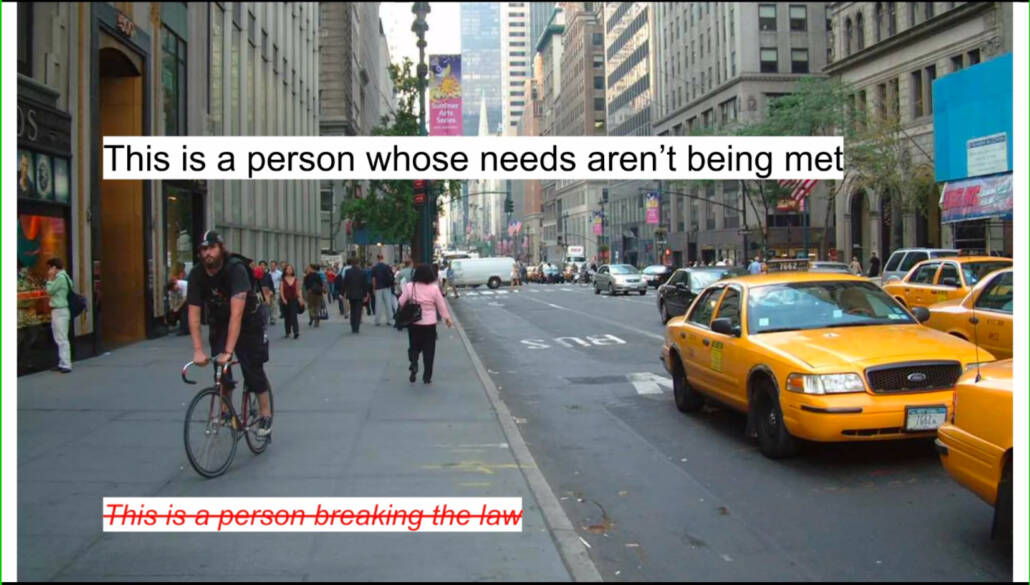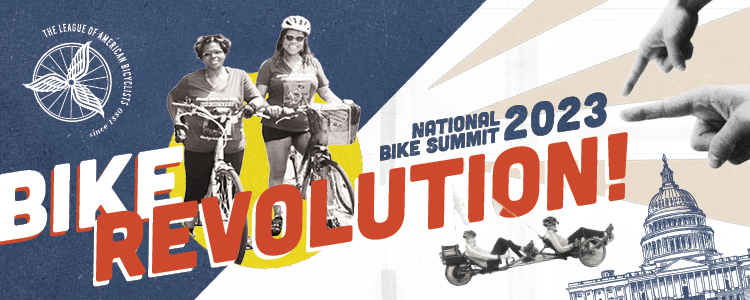CalBike Participates in National Bike Summit
During the final week of March, CalBike staff participated in the League of American Bicyclists’ National Bike Summit. At this multi-day, hybrid in-person and virtual event, our staff attended presentations, workshops, and virtual bike tours, and participated in Lobby Day meetings with members of Congress and their legislative staff. Read on below for personal reflections on the event from CalBike staff members.
Lobby Days in D.C. without leaving California
Perhaps CalBike’s most important role at the National Bike Summit was that of state coordinator for California participants of the event’s Lobby Day. On the final day of the event, in-person attendees in Washington, D.C., and virtual attendees from across the country lobby members of Congress and present a series of requests related to pending bicycle legislation.
As state coordinator, CalBike staff took an active role in scheduling, coordinating, and preparing delegates for Lobby Day meetings, and many CalBike staff participated in Lobby Day meetings with their own representatives. After all was said and done, CalBike’s Administrative Associate Stefany Alfaro had scheduled and coordinated 18 meetings with the offices of California members of Congress and their staff, and over 40 California delegates and bicycle advocates participated in-person and online.
CalBike staff reflect on Summit experiences
Kevin Claxton, Interim ED: A fantastic first Summit
This was my first time participating in the League’s National Bike Summit, and my first Congressional lobbying experience. The event itself was incredibly well-run, with great takeaways for CalBike’s own California Bicycle Summit, and I’m thrilled that our full staff was able to participate. The sessions and plenaries were varied and informative, with important lessons for local and state-level advocates alike on building safer and more inclusive bike networks for women, strategies for better connectivity in rural areas, and so much more. I was so inspired to hear about the progress of local advocates and community organizations working in areas that are aligned with CalBike’s Invest/Divest campaign — like Bike Houston’s coalition efforts around their I-45 freeway expansion.
While I was perhaps intimidated by my first meeting with the legislative team of a member of Congress, the League provided a great set-up and resources to ensure that Lobby Day participants had the information we needed to make a strong case for 2023’s pending bicycle-friendly legislation. Congrats to the League of American Bicyclists on a fantastic event.
Jared Sanchez, Policy Director: Hope that Caltrans understands the importance of addressing past injustices caused by freeway building
One session that jumped out for me was The Civil Rights of Fighting Highways. Jeanie Ward-Waller, a Deputy Director at Caltrans and former CalBike staffer, spoke about why bike advocates and any advocates for livable, sustainable communities should care about highway projects, and her ideas dovetailed perfectly with the Invest/Divest Campaign we launched this year. She noted that the vast majority of transportation funding is still going into highways, in California as well as other states. To get the money we need to build Complete Streets and connected bike networks, we need to shift transportation funds away from regressive freeway projects, which is exactly what we’re urging our representatives to do in the next budget.
Ward-Waller said forming coalitions to make the case that a freeway project isn’t going to benefit the community is a successful approach to stopping freeway projects. She also expressed the belief that California transportation agencies need to go above and beyond in righting the wrongs of the history of building the highway system in this country. Communities of color still bear the harm from the legacy of being divided and displaced by building highways.
I was inspired to hear a powerful voice from inside Caltrans who understands the need to center equity and sustainability in our transportation planning. Getting the whole agency behind those sentiments is a bigger lift, but the National Bike Summit redoubled my inspiration to advocate for change at Caltrans.
Nicolay Kreidler, Communications Director: What it takes to give women equitable access to active transportation
I attended many terrific sessions at the National Bike Summit, but one that stood out was Safe Streets for Women. The share of bike riders by gender reflects how well a community has done in building safe infrastructure. In the U.S., most bike riders are male, while 50% or more of people on bikes in cities like Copenhagen are female-identified.
The speakers emphasized the need to prioritize measures that improve personal safety for women and marginalized communities, which has the added benefit of enhancing safety for everyone on a bike, sort of a Universal Design concept for bike infrastructure. This means taking an approach beyond emergency response, focusing on education, enforcement, and infrastructure.
One of the speakers was from Disability Rights Washington, which has pioneered A Week Without Driving, a challenge to lawmakers to experience life outside of a car for a week. It’s an initiative I’d love to see spread to other states, including California.

Laura McCamy, Communications Specialist: New insights on the ways current traffic enforcement policies harm communities without increasing safety
This was my first National Bike Summit, and I had the pleasant experience of having my mind blown by new ideas in multiple sessions. The session that stood out to me was focused on equitable traffic enforcement. That’s an issue we’ve been working on a lot at CalBike over the past few years, with an intensified focus in 2023, so I thought I had a pretty good understanding of the issues involved. Hearing from speakers steeped in this issue gave me a host of new insights and showed me how much more I have to learn about the issues around biased traffic stops.
Perhaps the biggest eye-opener for me was this: Pretextual traffic stops are designed to give police an excuse to search someone when they don’t have probable cause. Therefore, police conduct these stops in high-crime spots, not in areas with high levels of speeding or other traffic violations. So, not only do police single out people of color (especially Black men) for stops that can turn lethal, but these so-called “traffic stops” do nothing to reduce traffic violence.
Another nugget of information from the session was that 75% of the most dangerous roads in the U.S. are in low-income neighborhoods. That adds urgency to the Equity-First Transportation Funding Bill (AB 1525) that CalBike is working to pass. I left this session and the whole Summit even more excited about CalBike’s agenda for 2023.
Andrew Wright, Individual Giving Manager: Opening a window into the world of bike advocacy
I had the amazing opportunity to learn from experts across the country who are working on a wide range of bike and active transportation projects at this year’s National Bike Summit. The variety of topics covered was truly remarkable, and I was able to dive deep into issues that affect rural communities, children, and people with disabilities.
As someone who is fairly new to the world of biking and active transportation, the Summit helped me to see just how serious the problems on our roads are all across America and the immense toll being paid with our tax dollars and lives lost. But it was also really heartening to hear from experts who are working diligently to find solutions to these challenges.
There were so many great ideas and initiatives presented at the summit, beyond building more biking infrastructure, such as creating traffic gardens for kids and promoting rails-to-trails projects in rural areas. All Americans could benefit from more access to active transportation. I also learned about the importance of criminal justice reform in improving outcomes for all. Overall, I came away from the summit feeling more optimistic and excited than ever about the future of biking!
Stefany Alfaro, Administrative Associate: A challenging but rewarding experience
This was my second time acting as the state coordinator at this amazing event. And it was so interesting to communicate with the different offices and observe the differences between them. Some offices seemed so eager to meet, worked with me to find the best times to meet, and helped with changes until the very last minute. Other offices, after five or six emails and phone calls, still never cared to respond. With all of the scheduling and last-minute challenges, little time was left for me to attend sessions. I want to take this opportunity to shout out the American League of Bicyclists’s team — Riley Titlebaum in particular — for all the hard work and support they provided. I am looking forward to doing it all over again next year!





